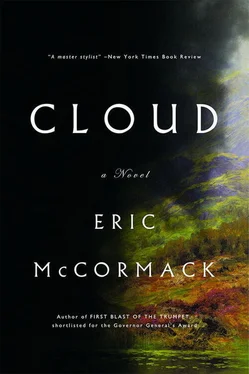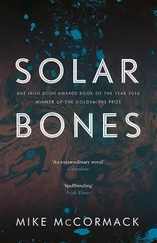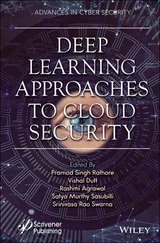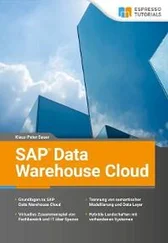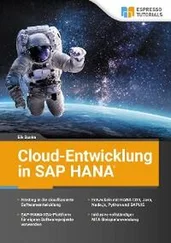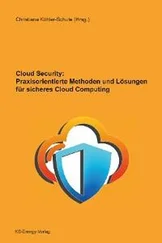ACCORDING TO THE nubionomist, Macbane’s cloud certainly ought not to be dismissed out of hand as a piece of fiction. “A black cloud that acts as a mirror to the earth beneath may seem astonishing,” he wrote, “but like a magnitude ten earthquake, or a tsunami the height of the Eiffel Tower, it’s certainly in the realm of theoretically possible natural phenomena.”
In his mind, it was quite feasible that silica dust from some distant volcanic eruption, carried by high atmospheric winds, might indeed bring about what could be called an “obsidian cloud.” The high concentration of shiny particles in it might well be similar to the mirror effect produced by those tinted windows in some modern buildings. And if a cloud of that makeup were later to dissolve into rain, that rain itself would in all probability have black properties.
Even the rather grisly notion of eyeballs bursting during the height of the occurrence would be consistent. “In extreme weather situations, sudden catastrophic increases in atmospheric pressure are common,” the nubionomist explained. “In hurricane conditions, for instance, doors and even walls have to be protected to prevent implosion — the external atmospheric pressure is greater than the internal. Also, ear barotrauma, which laypersons know as ear-popping, is frequent during hurricanes. It is just possible that in an extreme case, something as fragile as the human eye might indeed be vulnerable, in the same manner as air can be sucked out of a glass container.”
The nubionomist did, however, finish this astonishing letter on a cautionary note. Yes, an event like an “obsidian cloud” was possible— in theory . But, to his knowledge, in the entire history of nubionomic scholarship no such phenomenon had ever been recorded. “Surely,” he wrote, “especially in more recent times and in a small, populous country such as Scotland, any happening of this sort would have been observed and reported in appropriate publications by any number of qualified persons. That it should have been recorded in only one little book of dubious origins and that it should cite no credible scientific witnesses give cause for a warrantable skepticism.”
The nubionomist promised to keep Soulis informed if any future developments were to moderate his findings.
“THE CLOUD SPECIALIST probably didn’t know just how right he was about the credibility of the witnesses named in The Obsidian Cloud ,” said Soulis. “I’d already checked them out, and they weren’t what you’d call credible, by any means.” He looked at his watch. “I can tell you about them briefly if you like.”
I urged him to go ahead.
He glanced at another paper on his desk.
“Do you remember that Dr. Thracy de Ware who was supposed to have seen the cloud?”
I did remember the name.
“In the book he’s referred to as a ‘well-known naturalist and astronomer,’” said Soulis. “And it’s quite true that de Ware was well known in the early nineteenth century — but as an astrologer , not an astronomer . He used to go round the rural parts of Scotland predicting the future on the basis of the movement of the stars and planets. Nor was he a stranger to the justice system. I found his name in a number of court documents in connection with fraud — some of his clients lost fortunes on the basis of his predictions. In other words, he’d hardly be what scientists would call a credible witness.”
Soulis looked at his paper again.
“The book specifically mentioned the name of only one other witness — Meg Millar,” he said. “She was a poet and folklorist in Ayrshire around the same time as de Ware. According to one of the histories of Upland literature, she was called ‘The Moorland Minstrel.’ She compiled a collection of local legends and myths, which is very interesting. She also wrote hundreds of sonnets about the flowers of the region.” He rolled his eyes. “Only a few of them have survived, and maybe that’s just as well.”
I told Soulis I’d recognized Meg Millar’s name, too, when I first saw it in The Obsidian Cloud . I’d once read a story of hers about a disappointed man looking for a pot of gold. I didn’t tell Soulis that it was Miriam who’d given me the story, in Duncairn, and that the night I’d read it I was so full of love for her I’d no idea of the crushing disappointment she had in store for me. I’d sometimes wondered, looking back, if giving me the story was to prepare me for the blow.
“Yes, I’m familiar with that story, too,” said Soulis. “It’s one of her best known. In cultural studies they call it a ‘Dream’ story: versions of it are found in societies all round the world. They’re always about a hero who dreams of buried treasure then looks for it in the place the dream indicates. Sometimes he finds it, sometimes he doesn’t.” He added, “Naturally, in the Scottish versions, he doesn’t!”
We both smiled at that.
“As for Meg Millar’s life, not much is known about her, not even whether she was actually born in Ayrshire, or the dates of her birth and death,” said Soulis. “But the very fact that a collector of fantasies is used by Macbane as one of the authoritative witnesses to the cloud would again suggest it’s pure fiction.”
He checked his watch again. He’d been talking a little faster and louder the last few minutes.
“Well, it’s five to noon,” he said. “I think I’ve caught you up on everything of interest I’ve come across so far. If you want to get out of here before those chimes begin again, you’ll need to be on your way.” His fingers stroked The Obsidian Cloud once more. “Would you mind if I keep the book until my inquiries are finished? I could work with a photocopy, but it’s not quite the same thing as having a real book in hand.”
I assured him that he could keep the original as long as he wished, and he thanked me profusely. I could see he’d become very attached to it.
On our way to the stairs, he kept talking.
“Let me assure you once again, we’ll keep working hard to solve all the problems,” he said. “As you can probably tell, from my perspective The Obsidian Cloud has been an exceptional find. It may not be a work of the very highest literary quality, but it’s in a tradition of Scottish fantasy literature going all the way back to the Middle Ages. In fact it’s really quite a bizarre example of the genre and may have vague links to the even earlier European tradition of the speculum —have you come across that? It’s the Latin word for ‘mirror.’ Some of the ancient metaphysical scholars thought that every single thing in this world was a symbol of everything else — that in a way, they mirror each other. A clergyman such as Macbane might well have been familiar with that tradition. Anyway, my assistant and I are determined to find out everything we can about just who the Reverend K. Macbane is. Though there’s always the chance we’ve already come to a dead end.”
WE SHOOK HANDS at the top of the stairs and he promised he’d write if any other discoveries were made.
“I hope you enjoy your journey to the Uplands,” he said. “Wouldn’t it be interesting if you ran into someone who still remembered you?”
That was precisely what I was hoping, but I didn’t say so. In fact I’d no time to say anything, for he spoke first:
“You’d better hurry — the clock’s about to strike noon!”
I ran down the stairs as fast as I could and got through the front door just as the building began its pre-chime tremor. The noise of workday traffic in the street only partly mufled the first enormous clang from the clock tower as I rushed along the sidewalk away from it.
Читать дальше
